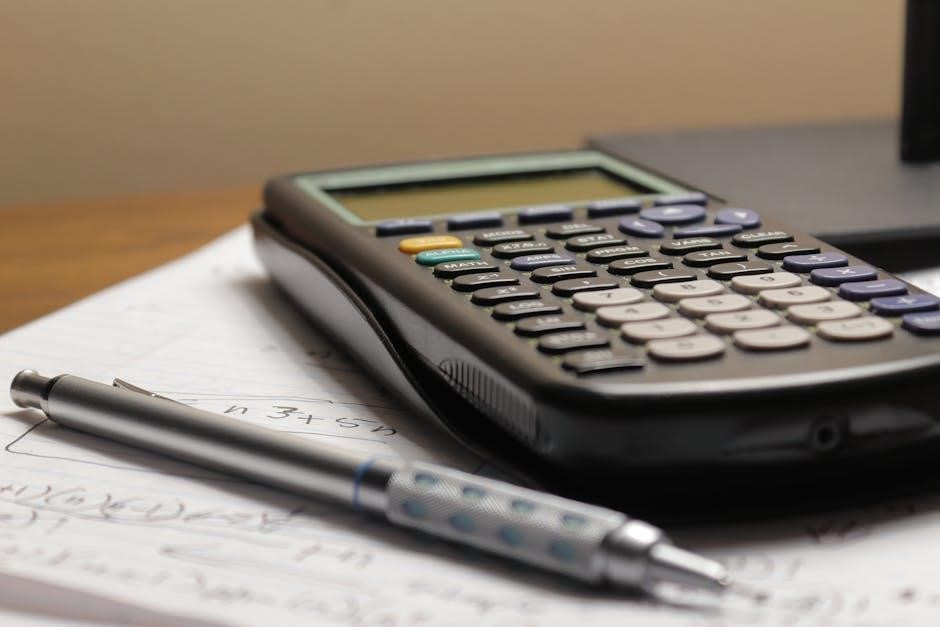John Monash Science School Entrance Exam: Sample Papers and Preparation
The John Monash Science School entrance exam is a competitive assessment for Year 9 students seeking Year 10 entry. Teacher-created sample papers provide invaluable practice, familiarizing students with question formats, difficulty, and time constraints.
Overview of the John Monash Science School Entrance Exam
The John Monash Science School (JMSS) entrance exam is a crucial step for Year 9 students aspiring to join the specialist science school in Year 10. This exam, administered by Edutest, assesses a student’s aptitude in mathematics, numerical reasoning, science reasoning, and their interest in science and communication skills. The selection process also includes an interview day for shortlisted applicants, involving group activities and one-on-one interviews, but application process is handled externally by Edutest, and JMSS staff cannot influence this process. The exam is designed to identify students who are proficient in mathematics, demonstrate strong English communication skills, apply scientific reasoning, and exhibit logical thinking. Due to the competitive nature of JMSS placements, thorough preparation is essential for success. Utilising sample papers, particularly those created by teachers, is a key strategy for students to familiarise themselves with the exam’s format, question types, and difficulty levels.
Exam Structure for Year 10 Entry
The John Monash Science School entrance exam for Year 10 entry, typically taken by Year 9 students, comprises several distinct tests designed to assess different skills and knowledge areas. These tests include mathematics, numerical reasoning, science reasoning, and a science interest and communication component. The mathematics section usually consists of multiple-choice questions, evaluating problem-solving abilities and mathematical concepts. The numerical reasoning section assesses the ability to interpret and analyse numerical data. The science reasoning component tests scientific knowledge and the ability to apply scientific principles to solve problems. The science interest and communication section may involve a written essay or questions based on a provided science practical report, focusing on data interpretation and scientific communication. Each section is timed, requiring effective time management strategies. Familiarising oneself with the structure and question types through sample papers is crucial for exam preparation.
Importance of Sample Papers for Preparation
Sample papers are critical for preparing for the John Monash Science School entrance exam, offering invaluable practice and insights. By working through sample papers, students become familiar with the exam format, question types, and difficulty levels. This familiarity reduces anxiety and builds confidence. Sample papers also help students identify their strengths and weaknesses, allowing them to focus their study efforts on areas needing improvement. Practicing with timed sample papers simulates the actual exam environment, enabling students to develop effective time management strategies; Furthermore, sample papers provide exposure to a wide range of questions, enhancing problem-solving skills and scientific reasoning abilities. Regularly using sample papers allows students to track their progress and adjust their preparation strategies accordingly. Accessing teacher-created sample papers or Edutest practice exams can provide a realistic and comprehensive preparation experience, significantly increasing the chances of success in the entrance exam.

Understanding the Exam Content

The John Monash Science School entrance exam assesses maths, numerical and science reasoning, and science interest. Sample papers help familiarize students with each section’s specific question types and required skills.
Mathematics Section: Key Topics
The mathematics section of the John Monash Science School entrance exam is designed to assess a student’s proficiency in core mathematical concepts and problem-solving abilities. Based on available information and sample materials, key topics to focus on include algebra, geometry, and data analysis. Students should practice simplifying expressions, solving equations, and working with inequalities.
Geometry questions often involve understanding shapes, angles, and spatial reasoning. Familiarity with formulas for area, volume, and perimeter is essential. Data analysis may include interpreting graphs, calculating averages, and understanding statistical concepts.
Furthermore, the exam may present word problems that require students to apply mathematical principles to real-world scenarios. It is also important to know about rates and angles.
Therefore, consistent practice with a variety of problems is crucial for success. Sample papers can help students identify areas of strength and weakness, allowing them to tailor their study efforts effectively. Focus on conceptual understanding and problem-solving strategies to excel in this section.
Numerical Reasoning Section: What to Expect
The Numerical Reasoning section of the John Monash Science School entrance exam assesses a student’s ability to interpret and analyze numerical data presented in various formats. Expect to encounter questions involving tables, charts, graphs, and other visual representations of data. The focus is not only on mathematical skills but also on logical reasoning and the ability to draw conclusions from the information provided.
Students should be prepared to perform calculations, identify patterns, and solve problems based on the given data. Questions may require calculating percentages, ratios, averages, and other statistical measures. Time management is crucial, as this section often includes a large number of questions to be answered within a limited time frame.
Practice with sample papers is essential to familiarize yourself with the types of questions asked and to develop effective strategies for approaching them. Focus on understanding the context of the data and identifying the key information needed to solve each problem.
Science Reasoning Section: Focus Areas
The Science Reasoning section of the John Monash Science School entrance exam evaluates your ability to apply scientific principles and reasoning skills to solve problems. This section emphasizes understanding scientific concepts rather than rote memorization of facts. Expect questions that require you to analyze experimental data, interpret scientific texts, and draw conclusions based on evidence.
Key focus areas may include biology, chemistry, and physics concepts typically covered in Year 9 science curricula. Topics like cell biology, chemical reactions, energy transfer, and motion are likely to appear. You may also encounter questions related to scientific methodology, such as designing experiments, identifying variables, and interpreting results.
Practice with sample papers is vital to familiarize yourself with the types of questions and the level of scientific understanding expected. Pay close attention to the details provided in the question scenarios and use your reasoning skills to arrive at the correct answer. Focus on understanding the underlying scientific principles rather than just memorizing facts.
Science Interest and Communication
The Science Interest and Communication section of the John Monash Science School entrance exam assesses your passion for science and your ability to communicate scientific ideas effectively. This section often involves analyzing a scientific practical report and answering related questions, showcasing your ability to interpret data and draw meaningful conclusions. Expect questions that require you to write a basic report or essay, emphasizing your ability to convey scientific information clearly and concisely.
This part of the exam focuses more on your ability to interpret information than on your pre-existing science knowledge. You will likely need to demonstrate your understanding of the scientific method, data analysis, and experimental design.
Preparing for this section involves practicing writing clear and concise scientific reports, interpreting data from graphs and tables, and articulating your interest in science through well-structured essays. Focus on showcasing your enthusiasm for science and your ability to communicate complex ideas in an accessible manner. Reviewing sample papers and practicing your writing skills are essential for success.

Where to Find Sample Papers
To prepare effectively, explore Edutest practice exams, teacher-created papers, and online resources. These materials familiarize you with question types, difficulty levels, and the overall exam structure for optimal preparation.
Edutest Practice Exams
Edutest practice exams are a crucial resource for students preparing for the John Monash Science School entrance exam. These meticulously designed exams mirror the actual test’s format and difficulty, providing invaluable experience under simulated conditions. Students can purchase and download practice exams from the Edutest website to familiarize themselves with the testing environment. These exams help students become accustomed to the different types of questions, difficulty of questions, exam time limits, etc.
While Edutest doesn’t offer science-specific practice tests, their resources are designed to help students prepare for the testing environment. Full-length, timed practice exams modelled after the real John Monash Science School entrance test. These are meticulously designed to simulate testing conditions and provide students with the practice they need to excel. Every question comes with in-depth solutions and explanations. Students can thoroughly revise for the John Monash Science School Entrance exam;
Teacher-Created Sample Papers
Teacher-created sample papers are an invaluable resource for students preparing for the John Monash Science School entrance exam. These resources offer a unique perspective, reflecting the specific curriculum and teaching styles that students may encounter. These sample papers help students familiarize themselves with question types, difficulty levels, and time constraints.
These papers also provide a glimpse into the school’s expectations, giving students a better understanding of the skills and knowledge valued by the educators. By working through these materials, students can identify their strengths and weaknesses, allowing them to focus their study efforts effectively. The John Monash Science School entrance exam is highly competitive, assessing Year 9 students for Year 10 entry. These resources help students familiarize themselves with question types, difficulty levels, and time.
These practice exams have been designed by teachers to be as realistic as possible.
Online Resources and Guides
A wealth of online resources and guides can further aid students preparing for the John Monash Science School entrance exam. These digital tools offer diverse learning materials, from interactive quizzes to comprehensive study guides. Edutest provides practice exams designed to help students prepare for the testing environment. Several online platforms offer sample questions and practice tests that mimic the exam’s format and content.
Students can find guides that break down key concepts, providing step-by-step explanations and examples. Additionally, online forums and communities offer a space for students to connect, share tips, and ask questions. These platforms can be a valuable source of support and encouragement, helping students stay motivated and confident. These resources help students familiarize themselves with question types, difficulty levels, and time constraints.
The full course can be used to prepare for the John Monash Science School entry exam. For anyone wanting to revise for the John Monash Science School Entrance exam.

Effective Preparation Strategies
Effective preparation involves strategic time management, understanding diverse question types, and consistent practice with timed exams. These strategies are crucial for maximizing performance on the John Monash Science School entrance exam.
Time Management During the Exam
Effective time management is crucial during the John Monash Science School entrance exam. Given the exam’s structure, allocating appropriate time to each section is paramount. The mathematics section, with 60 questions in 30 minutes, demands efficient problem-solving skills. Similarly, the numerical reasoning section requires swift calculations to address 50 questions within 30 minutes.
The science reasoning and interest sections also require careful time allocation. Practicing with sample papers helps students gauge their speed and accuracy. Simulated exam conditions can help students develop a sense of pacing and identify areas that require more time.
It is also important to develop a strategy for addressing difficult questions. If a question proves challenging, it may be wise to skip it and return later, ensuring that time is not wasted on a single problem. Regular practice with timed mock exams is essential.
Understanding Question Types
Familiarizing yourself with the various question types is crucial for success in the John Monash Science School entrance exam. The exam typically includes mathematics, numerical reasoning, science reasoning, and science interest sections. Each section features distinct question formats that require specific approaches.
Mathematics questions often involve problem-solving, algebraic manipulation, and geometric concepts. Numerical reasoning questions test the ability to interpret data and identify patterns. Science reasoning questions require applying scientific principles to novel situations, while science interest questions may involve analyzing experimental data or interpreting scientific reports.
Practice with sample papers helps students become accustomed to the style and format of the questions. This familiarity allows them to approach the exam with confidence and efficiently allocate their time. Understanding the question types also enables students to develop targeted strategies for tackling each section, maximizing their chances of success.
Practicing with Timed Practice Exams
Practicing with timed practice exams is a vital step in preparing for the John Monash Science School entrance exam. These exams simulate the actual testing environment, helping students develop effective time management skills and build confidence under pressure. By replicating the exam’s time constraints, students learn to pace themselves and allocate adequate time to each question.
Timed practice allows students to identify areas where they struggle with speed and accuracy. It also helps them become comfortable with the exam format and question types, reducing anxiety on the actual test day. Regularly taking timed practice exams enables students to track their progress and refine their strategies.
Furthermore, timed practice helps students develop a sense of urgency and focus. They learn to prioritize questions and make informed decisions about which ones to attempt first. This skill is crucial for maximizing their score within the given time limit. Consistently practicing with timed exams builds resilience and prepares students to perform their best under pressure.

Additional Resources and Support

To enhance preparation, explore Edutest website resources, tutoring, workshops, and school information nights. JMSS doesn’t endorse tutoring companies, so focus on officially provided materials for the entrance exam.

Edutest Website Resources
The Edutest website serves as a crucial resource for students preparing for the John Monash Science School entrance exam. Recognizing the importance of thorough preparation, JMSS recommends that students consider purchasing and downloading at least one practice exam from the Edutest website. These practice exams are designed to simulate the actual testing environment, helping students become familiar with the format, question types, and time constraints they will encounter during the real exam.
While Edutest does not provide practice tests specifically focused on science, the available resources are designed to help students prepare for the overall testing environment. These resources can help students develop effective time management skills and build confidence in their ability to answer a variety of question types. By utilizing the Edutest website resources, students can gain a valuable advantage in their preparation for the John Monash Science School entrance exam.

Tutoring and Workshops
While John Monash Science School doesn’t endorse specific tutoring companies, face-to-face tuition and workshops can supplement exam preparation. These resources can provide targeted support in areas where students need extra help. Some courses focus on relevant exam topics like maths, chemistry, and numerical reasoning. They can also offer comprehensive study materials, practice tests, and personalized guidance.
Workshops often simulate testing conditions, helping students manage time effectively. Tutoring provides individualized attention, addressing specific weaknesses and building confidence. However, JMSS emphasizes that tutoring isn’t essential for success. Students should prioritize utilizing official resources and developing strong study habits. Carefully consider the benefits and costs before investing in external tutoring or workshops, ensuring they align with individual learning needs and preferences.
School Information Nights and Tours
John Monash Science School hosts information nights to provide prospective students and their families with essential details about the school. These events cover curriculum opportunities, key policies, and procedures. Recordings of information nights may be available online for those unable to attend in person.
School tours offer a glimpse into the school’s environment and facilities. Tours are typically scheduled on specific dates and require bookings. These tours provide an opportunity to see the school in action and ask questions. A 360-degree online tour may also be available. Attending information nights and tours is highly recommended. This will help you to gain a comprehensive understanding of JMSS and its offerings before applying. These events aid informed decision-making.

Application Process Details
To be eligible for selection at JMSS, students must apply and sit the entrance test. Applications are handled externally by Edutest. There is a cost involved with your application. Review eligibility and deadlines.
Eligibility Requirements for Application
To be eligible for selection at John Monash Science School (JMSS) and participate in the entrance exam, prospective students must meet specific criteria. Primarily, applicants should be in Year 9, seeking entry into Year 10 for the following academic year. A passion for science, mathematics, and technology is highly regarded, reflecting the school’s specialist focus.
Furthermore, students should demonstrate proficiency in mathematics, possess strong English communication skills, and exhibit the ability to apply scientific reasoning to problem-solving. Logical and coherent thinking is also essential. The application process involves completing a formal Entry Assessment, which includes written assessments administered by Edutest.
It’s important to note that JMSS does not support or endorse any tutoring companies, emphasizing that external tutoring is not essential for success in the entry assessment. Meeting these requirements ensures that students are well-prepared to thrive in the challenging and rewarding environment at John Monash Science School.
Application Deadline and Key Dates
Prospective students aiming for Year 10 entry at John Monash Science School must adhere to strict application deadlines and key dates. For entry in 2026, applications open well in advance, and typically close around the 23rd of May 2025. It’s crucial to consult the official JMSS website for the most accurate and up-to-date information, as dates may vary slightly each year.
Following the application deadline, the entrance exam, administered by Edutest, takes place. The exact date for the Entry Tests will be provided on the JMSS website. Successful applicants may then be invited to an Interview Day, involving group activities and one-on-one interviews.
Parents and students should attend information evenings and school tours to gain insights into the school’s curriculum and environment. After accepting an offer, attendance at information evenings and course counseling sessions is mandatory. These key dates ensure a structured and transparent application process for all prospective students.
Special Consideration and Illness/Misadventure Forms
John Monash Science School provides mechanisms for students whose exam performance is affected by unforeseen circumstances. A Special Consideration Form addresses situations where illness, injury, or personal trauma may have negatively impacted a student’s ability to perform during the entrance examination. This form should be completed and submitted with supporting documentation.
An Illness or Misadventure Form is available if a student is unable to attend the exam due to sickness or an accident. Timely submission of this form, accompanied by relevant evidence, is essential to ensure the student’s situation is considered.
Both forms can typically be downloaded from the JMSS website and should be returned to the designated email address. Submitting these forms does not guarantee an alternative outcome, but it ensures the school is aware of any extenuating circumstances. Adhering to the guidelines and deadlines for submission is crucial for proper consideration. These forms promote fairness in the application process.
